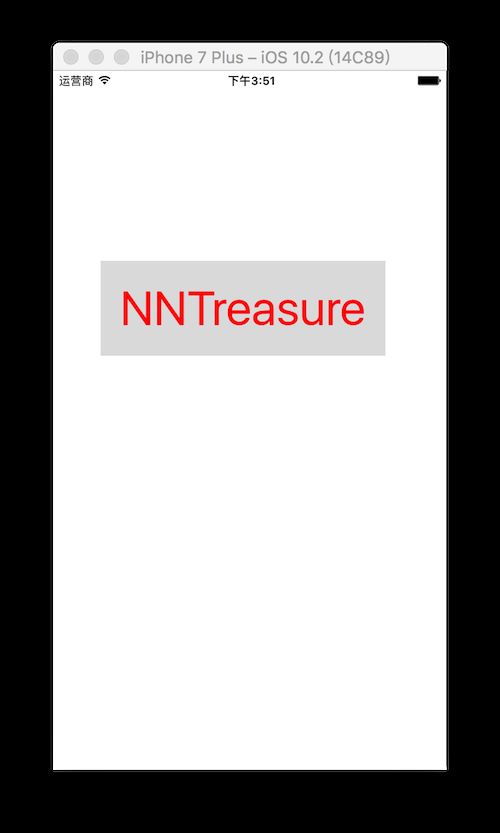因为有 Masory 以及 Snapkit 这些知名开源库的存在,相信很多 iOS 开发者对链式编程都不会太陌生,先来看下面这句代码:
[imageView mas_makeConstraints:^(MASConstraintMaker *make) {
make.top.bottom.left.right.equalTo(self.view).insets(UIEdgeInsetsMake(250, 100, 250, 100));
}];
这句代码就属于链式编程,而且 Masonry 框架本身也是通过链式语法对 NSLayoutConstraints 进行的封装。对 Masonry 感兴趣的童鞋可以读读这篇文章 iOS开发之源码解析 - Masonry。
链式编程思想:
所谓链式编程就是通过点(.)将多个操作链接在一起成为一句代码,使代码更加紧凑,也提高了代码的可读性(如上面那句代码)。
链式编程特点:
- 方法的返回值是 block,block 中必须有一个返回值,通常返回它本身,也可以是处理后的数据或对象。
- 返回值中的 block 具备两个功能,第一:可以作为类的属性被'点'出来。第二:可以当作函数直接调用。
- 通常会通过调用一个函数来给属性赋值,在函数内部封装赋值的语句,也可以加入一些判断逻辑等。
链式编程练习
我这里写了一个 UILabel 的扩展类用来练习链式编程,叫做 UILabel+NNCategory。利用这个分类创建 UILabel,并为其设置frame,text,font,textColor,backgroundColor等属性,代码如下:
[UILabel addToView:self.view createLabel:^(UILabel *label) {
label.nn_frame(50, 200, 300, 100).nn_text(@"NNTreasure").nn_fontSize(50).nn_textColor([UIColor redColor]).nn_backgroundColorRGB(224, 224, 224, 1).nn_textAlignment(NSTextAlignmentCenter);
}];
细心观察上面的代码,我们可以猜出 nn_frame(),nn_text(),nn_fontSize() 这些都是属性,不过为什么它们后面都带有括号呢?这是因为这些属性都是 block 类型。那么为什么它们可以点出来呢?即为什么可以 label.nn_frame().nn_text().nn_fontSize() 这么用?简单来说,就是因为这些 block 类型的属性都带有返回值!
下面是分类 UILabel+NNCategory 的详细实现过程
- 在 UILabel+NNCategory.h 中声明一些属性
@property (nonatomic, copy, readonly) UILabel *(^nn_text)(NSString *);
@property (nonatomic, copy, readonly) UILabel *(^nn_frame)(CGFloat, CGFloat, CGFloat, CGFloat);
@property (nonatomic, copy, readonly) UILabel *(^nn_attributedText)(NSAttributedString *);
@property (nonatomic, copy, readonly) UILabel *(^nn_textAlignment)(NSTextAlignment);
@property (nonatomic, copy, readonly) UILabel *(^nn_textColor)(UIColor *);
@property (nonatomic, copy, readonly) UILabel *(^nn_textColorRGB)(CGFloat, CGFloat, CGFloat, CGFloat);
@property (nonatomic, copy, readonly) UILabel *(^nn_backgroundColor)(UIColor *);
@property (nonatomic, copy, readonly) UILabel *(^nn_backgroundColorRGB)(CGFloat, CGFloat, CGFloat, CGFloat);
@property (nonatomic, copy, readonly) UILabel *(^nn_highlightTextColor)(UIColor *);
@property (nonatomic, copy, readonly) UILabel *(^nn_highlight)(BOOL);
@property (nonatomic, copy, readonly) UILabel *(^nn_enable)(BOOL);
@property (nonatomic, copy, readonly) UILabel *(^nn_font)(UIFont *);
@property (nonatomic, copy, readonly) UILabel *(^nn_fontSize)(NSInteger);
@property (nonatomic, copy, readonly) UILabel *(^nn_shadowColor)(UIColor *);
@property (nonatomic, copy, readonly) UILabel *(^nn_shadowOffset)(CGSize);
@property (nonatomic, copy, readonly) UILabel *(^nn_lineBreakMode)(NSLineBreakMode);
@property (nonatomic, copy, readonly) UILabel *(^nn_numberOfLine)(NSInteger);
@property (nonatomic, copy, readonly) UILabel *(^nn_adjustsFontSizeToFitWidth)(BOOL);
@property (nonatomic, copy, readonly) UILabel *(^nn_baselineAdjust)(UIBaselineAdjustment);
@property (nonatomic, copy, readonly) UILabel *(^nn_drawText)(CGRect);
我们在 UILabel 分类里面声明了这些属性,所以接下来只要是 UILabel 类型都可以点出来这些属性。这里也可以看出这些属性都是 block 类型。我们抽出一句代码简单说明一下:@property (nonatomic, copy, readonly) UILabel *(^nn_text)(NSString *);,这句代码声明了一个 block(^) 原型,名字叫做 nn_text,包含了一个 NSString 类型的参数,返回值是 UILabel 类型。
- 在 UILabel+NNCategory.m 中实现
- (UILabel *(^)(NSString *))nn_text {
return ^(NSString *text) {
self.text = text;
return self;
};
}
- (UILabel *(^)(CGFloat, CGFloat, CGFloat, CGFloat))nn_frame {
return ^(CGFloat X, CGFloat Y, CGFloat W, CGFloat H) {
self.frame = CGRectMake(X, Y, W, H);
return self;
};
}
- (UILabel *(^)(NSAttributedString *))nn_attributedText {
return ^(NSAttributedString *attributedText) {
self.attributedText = attributedText;
return self;
};
}
- (UILabel *(^)(NSTextAlignment))nn_textAlignment {
return ^(NSTextAlignment textAlignment) {
self.textAlignment = textAlignment;
return self;
};
}
- (UILabel *(^)(UIColor *))nn_textColor {
return ^(UIColor *textColor) {
self.textColor = textColor;
return self;
};
}
- (UILabel *(^)(CGFloat, CGFloat, CGFloat, CGFloat))nn_textColorRGB {
return ^(CGFloat r, CGFloat g, CGFloat b, CGFloat a){
self.textColor = [UIColor colorWithRed:r / 255.0 green:g / 255.0 blue:g / 255.0 alpha:a];
return self;
};
}
- (UILabel *(^)(UIColor *))nn_backgroundColor {
return ^(UIColor *backgroundColor) {
self.backgroundColor = backgroundColor;
return self;
};
}
- (UILabel *(^)(CGFloat, CGFloat, CGFloat, CGFloat))nn_backgroundColorRGB {
return ^(CGFloat r, CGFloat g, CGFloat b, CGFloat a) {
self.backgroundColor = [UIColor colorWithRed:r / 255.0 green:g / 255.0 blue:g / 255.0 alpha:a];
return self;
};
}
- (UILabel *(^)(UIColor *))nn_highlightTextColor {
return ^(UIColor *color) {
self.highlightedTextColor = color;
return self;
};
}
- (UILabel *(^)(BOOL))nn_highlight {
return ^(BOOL isHighlighted) {
self.highlighted = isHighlighted;
return self;
};
}
- (UILabel *(^)(BOOL))nn_enable {
return ^(BOOL isEnabled) {
self.enabled = isEnabled;
return self;
};
}
- (UILabel *(^)(UIFont *))nn_font {
return ^(UIFont *font) {
self.font = font;
return self;
};
}
- (UILabel *(^)(NSInteger))nn_fontSize {
return ^(NSInteger size) {
self.font = [UIFont systemFontOfSize:size];
return self;
};
}
- (UILabel *(^)(UIColor *))nn_shadowColor {
return ^(UIColor *shadowColor) {
self.shadowColor = shadowColor;
return self;
};
}
- (UILabel *(^)(CGSize))nn_shadowOffset {
return ^(CGSize size) {
self.shadowOffset = size;
return self;
};
}
- (UILabel *(^)(NSLineBreakMode))nn_lineBreakMode {
return ^(NSLineBreakMode mode) {
self.lineBreakMode = mode;
return self;
};
}
- (UILabel *(^)(NSInteger))nn_numberOfLine {
return ^(NSInteger number) {
self.numberOfLines = number;
return self;
};
}
- (UILabel *(^)(BOOL))nn_adjustsFontSizeToFitWidth {
return ^(BOOL b) {
self.adjustsFontSizeToFitWidth = b;
return self;
};
}
- (UILabel *(^)(UIBaselineAdjustment))nn_baselineAdjust {
return ^(UIBaselineAdjustment adjustment) {
self.baselineAdjustment = adjustment;
return self;
};
}
- (UILabel *(^)(CGRect))nn_drawText {
return ^(CGRect rect) {
[self drawTextInRect:rect];
return self;
};
}
UILabel+NNCategory.m 中的这些是 UILabel+NNCategory.h 文件中属性的 getter 方法。我们抽出一个简单说明一下
- (UILabel *(^)(NSString *))nn_text {
// 返回临时变量的 block
return ^(NSString *text) {
// block 执行的一些功能
self.text = text;
// block 执行完毕的返回值
return self;
};
}
这个属性的类型是 block,具体是 UILabel *(^nn_text)(NSString *) 类型,需要说明的是,我们用 block 并不是为了返回 block 对象本身,而是为了在 block 内部执行一些操作,所以我们在属性的 getter 方法中首先返回一个临时的 block 对象,主要是为了在 block 内部返回 UILabel 类型的对象。具体请看上面代码块中的一些注释。
这时我们还需要定义一个方法方便外界调用,这个方法主要有两个功能,第一是用来创建 UILabel ,第二是为其“点”出各种属性。
- 在 UILabel+NNCategory.h 中声明一个方法
+ (instancetype)addToView:(UIView *)superView createLabel:(void(^)(UILabel *label))block;
这里是模仿 Masonry,我们通常用 Masonry 加约束时首先会调用这个方法:- (NSArray *)mas_makeConstraints:(void(^)(MASConstraintMaker *make))block,
- (NSArray *)mas_makeConstraints:(void(^)(MASConstraintMaker *))block {
self.translatesAutoresizingMaskIntoConstraints = NO;
MASConstraintMaker *constraintMaker = [[MASConstraintMaker alloc] initWithView:self];
block(constraintMaker);
return [constraintMaker install];
}
我们用 Masonry 加约束时调用这个方法,是因为 Masonry 在这个方法内部早已做好一些所需要的操作。所以接下来我们也要在 UILabel+NNCategory.m 中做些事情。
- 在 UILabel+NNCategory.m 中实现这个方法
+ (instancetype)addToView:(UIView *)superView createLabel:(void(^)(UILabel *label))block {
// 创建 UILabel
UILabel *label = [[UILabel alloc] init];
// 把 UILabel 添加到传过来的 superView 上
[superView addSubview:label];
// 通过 block 进行回调
if (block) block(label);
return label;
}
上面这个方法首先初始化一个 UILabel 对象,接着把 UILabel 添加到传过来的 superView 上,然后对 block 进行回调,执行 block,把外界对 UILabel 设置的属性添加上去,最后返回 UILabel 对象。
这就是一些简单的链式编程思维,外界调用的时候只需如下代码即可:
[UILabel addToView:self.view createLabel:^(UILabel *label) {
label.nn_frame(50, 200, 300, 100).nn_text(@"NNTreasure").nn_fontSize(50).nn_textColor([UIColor redColor]).nn_backgroundColorRGB(224, 224, 224, 1).nn_textAlignment(NSTextAlignmentCenter);
}];
效果图如下:
